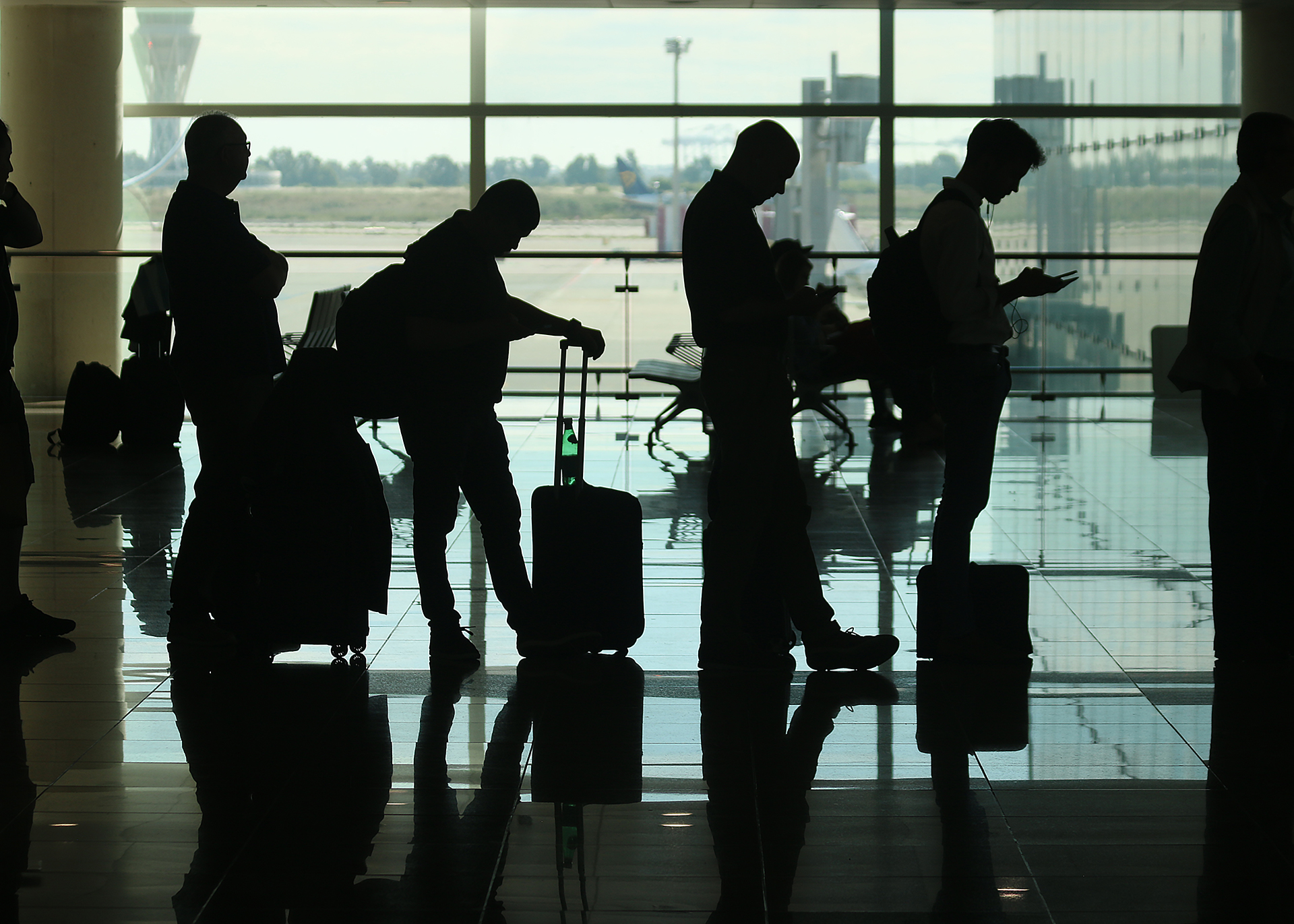The holiday season is upon us once again; and traveling between late November and early January can especially be incredibly stressful due to myriad factors — including crowds, delays, inclement weather, remembering things, and higher prices as only five of many examples. At least some of these 20 ways on how to reduce travel stress should be helpful to you.
20 Ways on How to Reduce Travel Stress
Travel can be stressful enough outside of the holiday season to cause you to wonder if getting away is even worth the effort — especially when the concept of travel is nascent to an inexperienced person. Finding a routine that is most comfortable for you leading up to the trip is important. How else can that stress be mitigated as much as possible?
Without further ado, the 20 ways on how to reduce travel stress are listed as follows…
1. Create a Master Itinerary Which Includes Lists.

As I plan my itinerary — which includes booking reservations for accommodations, purchasing tickets for flights, and figuring out how much time I need at certain intervals as three of many examples — I immediately record them onto a master itinerary on my computer. I record estimated costs, directions to where I am going, distances and time between stops, confirmation numbers, the list of currencies I expect to use and their currency exchange rates…
…and I list everything on my itinerary in the chronological order in which I expect to encounter them. For example, I will list my rental car information after the time of which the airplane is expected to land; and then my lodging information is listed immediately after that. I find this to be more efficient than clumping my air travel, lodging, vehicle rentals and other information together.
Even more helpful is prioritizing what you plan on doing. Use numbers or symbols to indicate what is most important on the trip so if you need to skip something because you are short on time, you know what can be removed from the itinerary. In the screen shot above, a ★ means highest priority; while a ☆ means lesser priority. No star at all is the least priority.
Color coding certain sections can help certain information stand out: for example, airline flight information can be in purple and rental car information can be in green. Bold, italic, and underlined type — as well as combinations thereof — can also be helpful for information to immediately stand out. Use different point sizes of type as well for headlines and subheadings. Do not overcomplicate this system — otherwise, the information will become just as difficult to find.
If you are traveling with someone, use a sharing technology such as Google Docs or Adobe Acrobat to construct an ideal itinerary together. Notes can be written and placed in pertinent sections of the itinerary.
2. Keep a Bag Packed.
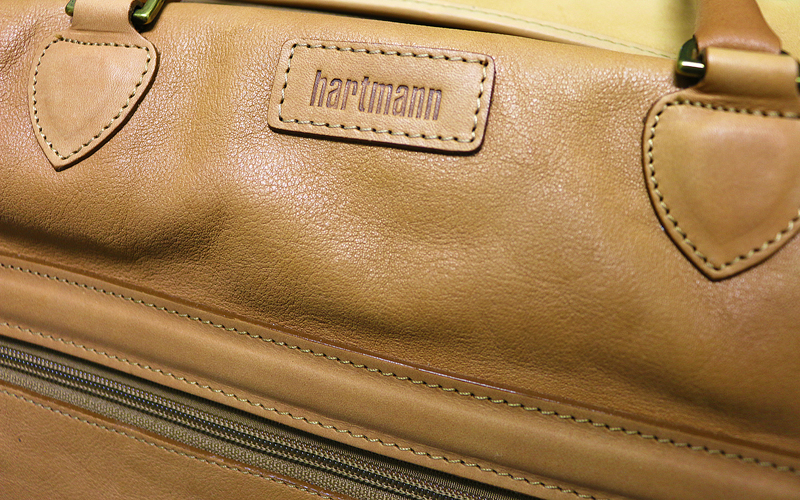
Between trips — even if that time may be weeks — I keep items which are completely dedicated to travel in my bag, as I do not remove them. Deodorant, disposable booties, and a clear quart sized zippered bag of toothpaste, shaving cream, mouthwash and other liquids are just some of the items I keep in my bag, ready for that next trip — especially if the trip is at the last minute.
Additionally, I often keep clean socks, underwear, and some other clothing items in the appropriate place in that bag.
This preparation — which I have been conducting for years — accomplishes two purposes: I save time packing my bag when the time to do so arrives; and I have fewer items to remember to pack, which can reduce stress.
Try to have your bag packed and ready to go as soon as you possibly can so that you are not stressed; and then double-check to ensure that you have everything you need or want to bring with you on the trip. Do not wait until the last minute before embarking on your trip.
3. Pack as Light as Possible.
A popular rule by which to abide is to pack everything you think you will want or need during the trip — and then remove half of the items before you travel. You want to strike that precarious balance of having just enough of what you need without forgetting anything, leaving any belongings behind, or carrying too much with you during your trip…
…and although I never had to do it because I have had it mentally stored in my mind for years, keeping a list of the items you want to take with you is a good idea.
Wearing the same clothes more than once is not exactly a crime against society — as long as they are not obviously stained or pungent with foul odors. A trick to packing light is to bring clothes which mix and match easily so that you do have a different outfit overall to wear every day you are traveling…
…and if keeping clothes pristine and clean is of the utmost importance to you during your trip, consider either having them cleaned by a service — but be prepared to pay for this privilege — or you can wash them yourself.
Packing light accomplishes several things:
- You do not have do check any baggage, which can save money on ancillary fees and time waiting for your belongings to appear on the conveyor belt in the baggage claim area
- Some ultra-low-cost airlines charge a fee for bags which are carried aboard the airplane but weigh more than a certain allowance — such as a weight limit seven kilograms or approximately 15 pounds, for example — so you can save money if your bag is light enough
- The bag is light enough for you to carry — especially when you have to sprint through the airport to catch your next flight
- Space in the overhead storage bin is not an issue once you are aboard the airplane — even if you are one of the last passengers to board the airplane and the overhead storage bins are full
- You have fewer items to remember to bring with you
A bonus is if you use luggage of a softer material — rather than those with a protective hard shell or roller bags — for the bag which you carry aboard the airplane, you have a significantly better chance of squeezing your gear into tighter spaces if the overhead storage bins are almost at capacity or the space under the seat in front of you is smallish.
4. Keep Yourself Updated.
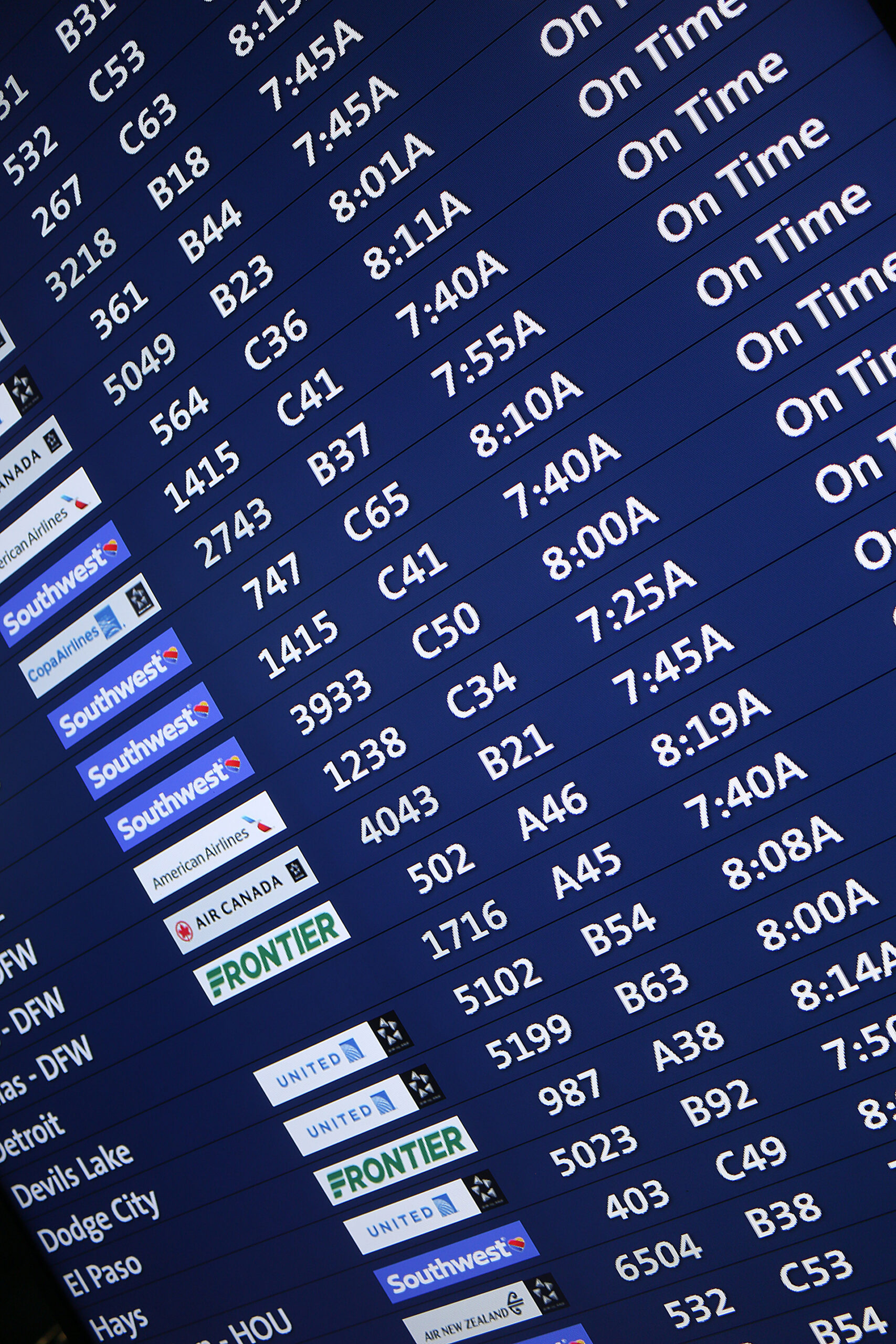
Irregular operations can — and do — occur unexpectedly. They are never pleasant when you are inconvenienced by them.
To keep yourself updated as to the latest news or anomalies that could affect your trip and help prevent you from waiting longer than necessary, either visit the official Internet web sites of the following entities for the latest updated information — or sign up to have them send updates to you:
- Airlines — for departure times, gate information, delays, and equipment changes
- Airports — for estimated times to get through security checkpoints, security measures, ground transportation information, dining information, airport lounge locations and hours, and from which gate the airplane is scheduled to depart
- MyTSA — You can:
- Quickly search which items you can bring with you through the checkpoint onto the airplane
- Check the delay information at your favorite airports nationwide
- Check how busy the airport is likely to be on your specific day and time of travel based on historical data
- Consult the TSA Guide on how to prepare for and get through the security checkpoint quickly
- Discover which airports and airlines support TSA PreCheck, and learn how to sign up
- Request live assistance from TSA through the AskTSA social media integration
5. Sign Up For — and Use — a Trusted Traveler Program.
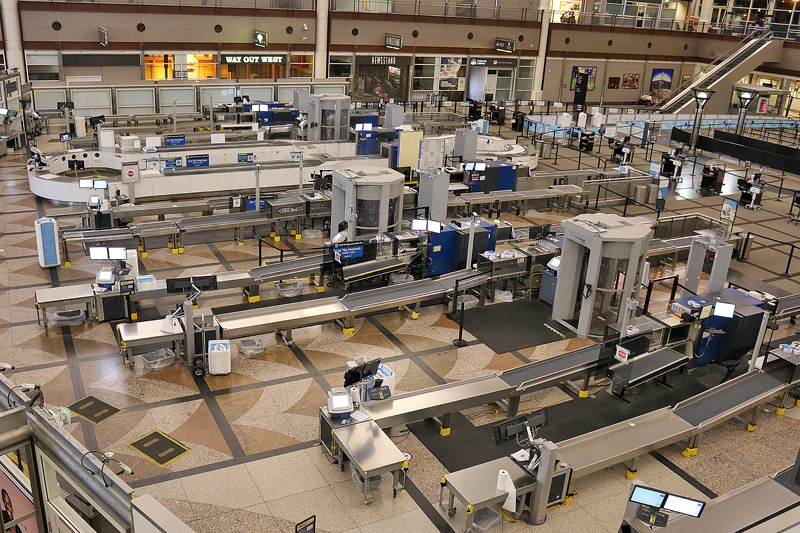
Signing up for a trusted traveler program for expedited screening at airport security checkpoints is not guaranteed to save you time. Sometimes the queues are longer than with regular lines when going through a security checkpoint at an airport. Sometimes the line to go through expedited screening may be closed…
…but not having to remove shoes from your feet or not having to remove the clear quart-sized resealable bag of liquids that are “comfortably” inside or computer electronic equipment from your baggage may be worth giving the federal government of the United States your sensitive personal information and paying a fee for the privilege of doing so.
As a benefit, some credit cards will pay the fee to join or renew in such trusted traveler programs as TSA Pre✓ or Global Entry or Nexus — so enrolling for any of these trusted traveler programs can essentially be free of charge for you.
Although being concerned about radiation from the screening machines or having certain parts of your body exposed is generally no longer an issue these days, you can still request a “pat-down” by an agent of the Transportation Security Administration instead of a full-body scan — but the manual screening will take more time.
6. Prevent Yourself From Getting Sick.

Winter is the time of year during which you stand to have the highest possibility of getting sick, as people — many of them sneezing, coughing and yawning without covering their mouths — are crammed in tight quarters at airports and in airplanes, trains, buses and shuttles…
…but a few simple habits to adopt will go a long way to prevent you from being sick. Take it from me, as I have not had a cold or flu or stomach virus in years.
- Wash your hands. I cannot emphasize enough how important is washing your hands properly and thoroughly; and I personally never use antibacterial wipes
- Do not touch anything above your neck unless your hands are definitely clean. This means no rubbing your eyes, poking your fingers inside of your ears, licking your fingers, or digging inside of your nose for “buried treasure” — and if you regularly wash your hands properly and thoroughly, you do not need antibacterial wipes or sanitizing gel, as I rarely ever use those items
- Watch what you eat. Some exotic foods and water may be benign for people native to an area — but you could be susceptible to catching a stomach virus, which could put you out of commission for several days — or even the remainder of your trip.
- Stay hydrated. Drink plenty of water — especially aboard an airplane on which the air is dry.
- Avoid jet lag. Despite how tired you may be, do not go to sleep at the wrong time of day or your entire scheduled could be off kilter — and you may have a better chance of avoiding jet lag when following at least some of the 14 tips and suggestions in this article
7. Put Metal Items In Your Carry-On Bag Prior to the Airport Security Checkpoint.

Instead of waiting until you are at the security checkpoint and ready to be screened, put keys, jewelry, and other metal items in your carry-on bag rather than in your pockets before you enter the queue. Doing so will save you time.
With the exception of my boarding pass and official identification, I personally empty everything out of my pockets and temporarily place them in a convenient yet secure area of my camera bag. If I use my mobile telephone to show my boarding pass, I keep it handy as along as possible until after it has been checked by agents of the Transportation Security Administration. After then, I place it with my other aforementioned belongings.
8. Travel Early in the Day — Especially on Tuesdays and Saturdays.

Delays are less likely to happen earlier in the day than later in the day — especially when the possibility of a domino effect may occur: one delayed flight can adversely affect the scheduling of later flights. The first flight in the morning is usually not delayed unless a mechanical failure or inclement weather occurs.
Also, you may encounter less crowded airports and airplanes.
Additionally, my experience suggests that traveling on Tuesdays and Saturdays are the easiest days to travel. Tuesdays and Wednesdays — and sometimes Saturdays — are also usually when discounts are offered by airlines.
9. Enjoy Your Downtime: Use Something to Distract You or Keep You Busy.

Some people like to read books. Other people like to read newspapers or magazines. Still others get their reading materials on portable electronic devices. Getting work accomplished on a laptop computer can be productive and efficient. If you encounter a delay or you are a passenger aboard an airplane for a long flight, you can use your downtime wisely by creating an opportunity to relax and distract yourself.
Breathing exercises and progressive muscle relaxation are only two of a plethora of ways to quickly relieve stress.
Music while looking out of the window of the airplane tends to be my distraction. I also have a few games on my portable electronic device. Sometimes I will write articles for The Gate With Brian Cohen and save them — and then publish them when I have access to the Internet.
You can also use distractions to relieve you of stressful situations around you — such as screaming children. You can try to sympathize with the parents of a screaming child and ask whether they need any help; or you can try to interact with the child himself or herself to help calm him down. I personally would usually do neither; but everyone is different.
10. Minimize Tasks Ahead of Time.

I try to prepare small mundane tasks and items for my trips in advance so that I do not have to think about them at the last minute.
For example, I charge all pertinent batteries — such as for my camera, mobile telephone and laptop computer — so that I do not have to be concerned about losing power too fast for my electronic devices.
Ensuring I carry dollar bills in smaller denominations for gratuities and for when I need to exchange a small amount of money can be helpful as well, which saves time on having to procure changing currency from larger denominations — and that can help to avoid being cheated while away.
11. Traveling With Companions.
Ensure that you engage in a frank discussion with traveling companions pertaining to what to expect from each other during the trip. How far are each of you willing to venture outside of your respective comfort zones? How will you share expenses? Do you need separate rooms? Who will sit in the aisle seat and who will sit in the window seat? On which types of cuisine does everyone prefer to dine? Is skipping a meal an option? What classes of service are considered spartan, acceptable or extravagant? What activities and other interests does everyone want to acknowledge and experience? Will you need some alone time away from each other?
Set your expectations reasonably to improve the chances of everyone enjoying the trip and to mitigate disappointment and bad surprises; and have each person set a list of rules and reach respectful compromises.
12. Know What Your Credit Cards Will Cover.

The credit cards you use will often have features which include various forms of travel protection and insurance — including roadside assistance, lost luggage coverage, rental car insurance, purchase protection, and trip cancellation coverage as only five of many examples.
If your credit card does offers at least some of these features, know the limits of the coverage and insurance. A major accident involving your rental vehicle is not the time to find out those limitations — especially if the vehicle which you rented is not covered under the protection policy.
As one example, rental car insurance that is offered by American Express cards can be quite useful — but know that that insurance coverage is not valid on rental vehicles in Australia, Italy, or New Zealand.
Exotic cars are another example of vehicles that are typically not covered by insurance that is included with most credit cards.
13. Consider Your Time Before, During and After a Trip.
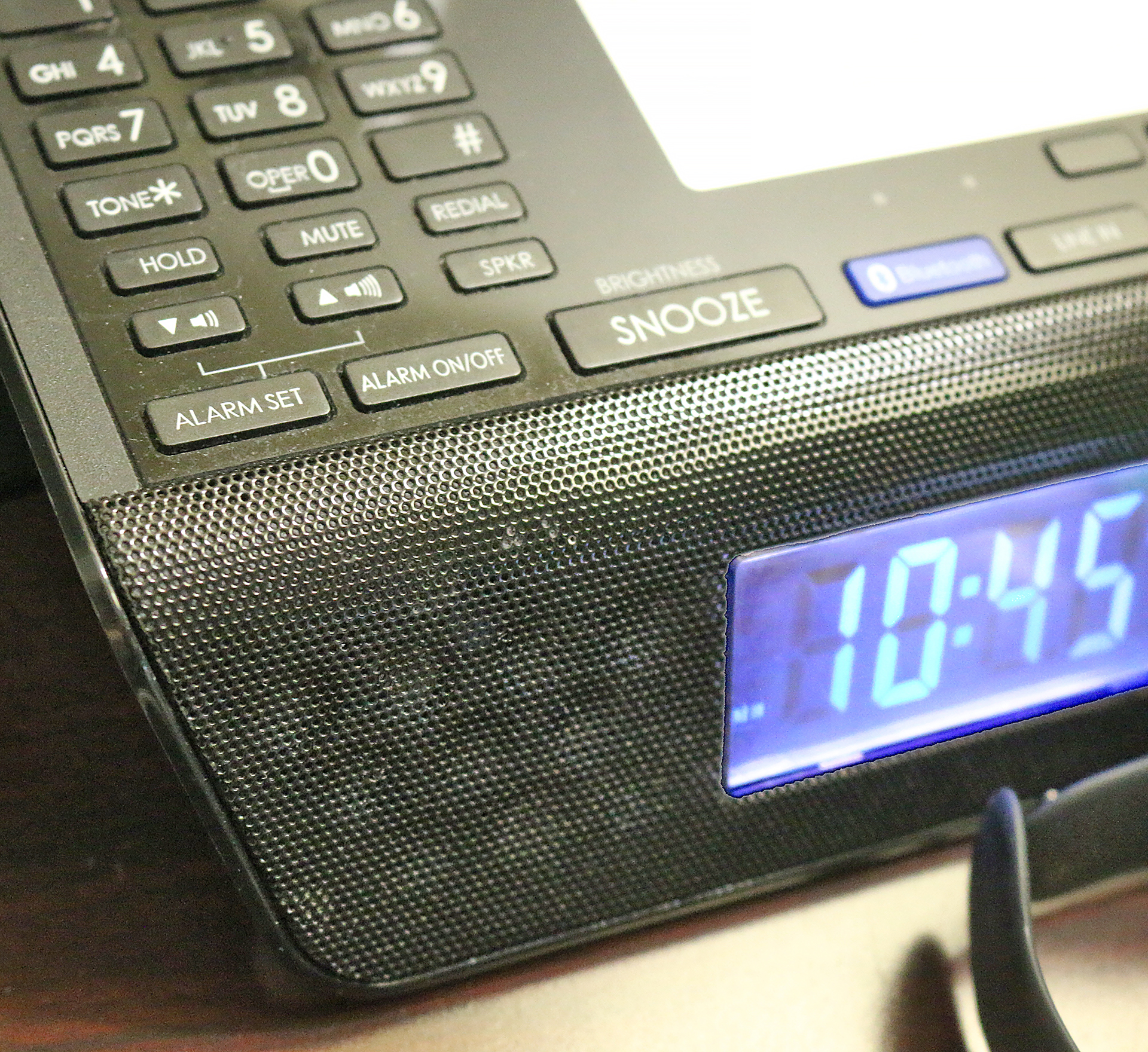
Although airlines in general recommend that you arrive at the airport no later than two hours prior to the departure of a domestic flight and three hours prior to the departure of an international flight, comfort level is subjective to each person. Some people prefer to arrive at least an hour earlier than recommended in order to patronize an airport lounge or to grab a bite to eat; while others will cut it close and arrive as late as possible prior to the departure of a flight. Consider how much time will be consumed for such scenarios as being in traffic or taking public transportation, finding parking for your vehicle if applicable, being processed through the security checkpoint at the airport, and the time needed to get from the security checkpoint to the gate.
If you arrive at the airport too early, try savoring that downtime instead of thinking that your time is being wasted. Once you have all of your information confirmed — such as the departure of your flight — you can take it easy by finding a quiet area of the airport and breathe slowly and deeply if you do not have access to an airport lounge. Perhaps listen to some music or play a game on your portable electronic device. You can also whip out the laptop computer and perhaps get some work done. Maybe you might want to call a family member or friend to have a conversation to relax you. Reading a book could also help to alleviate — or ward off — stress.
I tend to like to strike a balance of cramming as much into a trip as possible while striking that delicate balance of ensuring that I still get high quality out of as many components of the trip as possible; and sometimes the itinerary is punctuated with bits of slow decompression time — but this strategy is highly subjective to each individual and his or her preferences.
Finally, consider allowing some time before departure to prepare properly for your trip — as well as to relax — and time after your trip has concluded to properly decompress and prepare to realign yourself back into the everyday routine of your life. Some people have no problem arriving at the originating airport fresh off of an overnight flight and heading straight to work; while others may need a few days to readjust.
14. Do Not Assume Something Will Go Wrong — But Prepare For Worst Case Scenarios.

I typically base my trips around cost and schedule; but my trip to Chile during the summer of 2019 was unusual in that it evolved around catching a total solar eclipse. With that in mind, I added some side trips to the itinerary — such as traveling to Easter Island and taking a road trip around it — so that in case the total eclipse of the sun did not work out for whatever reasons, I still had an itinerary which was worth the time and effort to travel…
…but despite everything which could have gone wrong with the trip, it worked out perfectly as planned; and I was fortunate in that I got to see the total eclipse of the sun.
Then again, things do go wrong — like waiting four hours in a thunderstorm to get into Lesotho in a rental car with a flat tire — only to be locked out of the hotel property when I finally arrived. When things go wrong, think of it as an adventure. You may not believe so at the time when things go wrong; but people are captivated by stories of adventures during travel.
You have limited control over what can potentially go wrong on your trip; so try to anticipate what is the worst that may happen during your trip without stressing over it, as mishaps — such as long lines, inclement weather, and delays and cancellations of flights — are simply not an automatic given.
Also, think about what is the best that could happen on your trip, as good surprises can occur as well. Perhaps you may be unexpectedly upgraded to a seat in the premium cabin aboard an airplane or to a better room at the hotel or resort property at which you are staying. Maybe an experience will be better than you expected while simultaneously taking less time to do so. Perhaps you will spontaneously try something which you have never experienced before in your life — and the cost may be less expensive than you think. If that experience becomes a memory of a lifetime, that is a huge bonus.
Finally, be as realistic as possible with your expectations so that you are not stressed out when things do not go as planned.
15. Dress For Comfort.
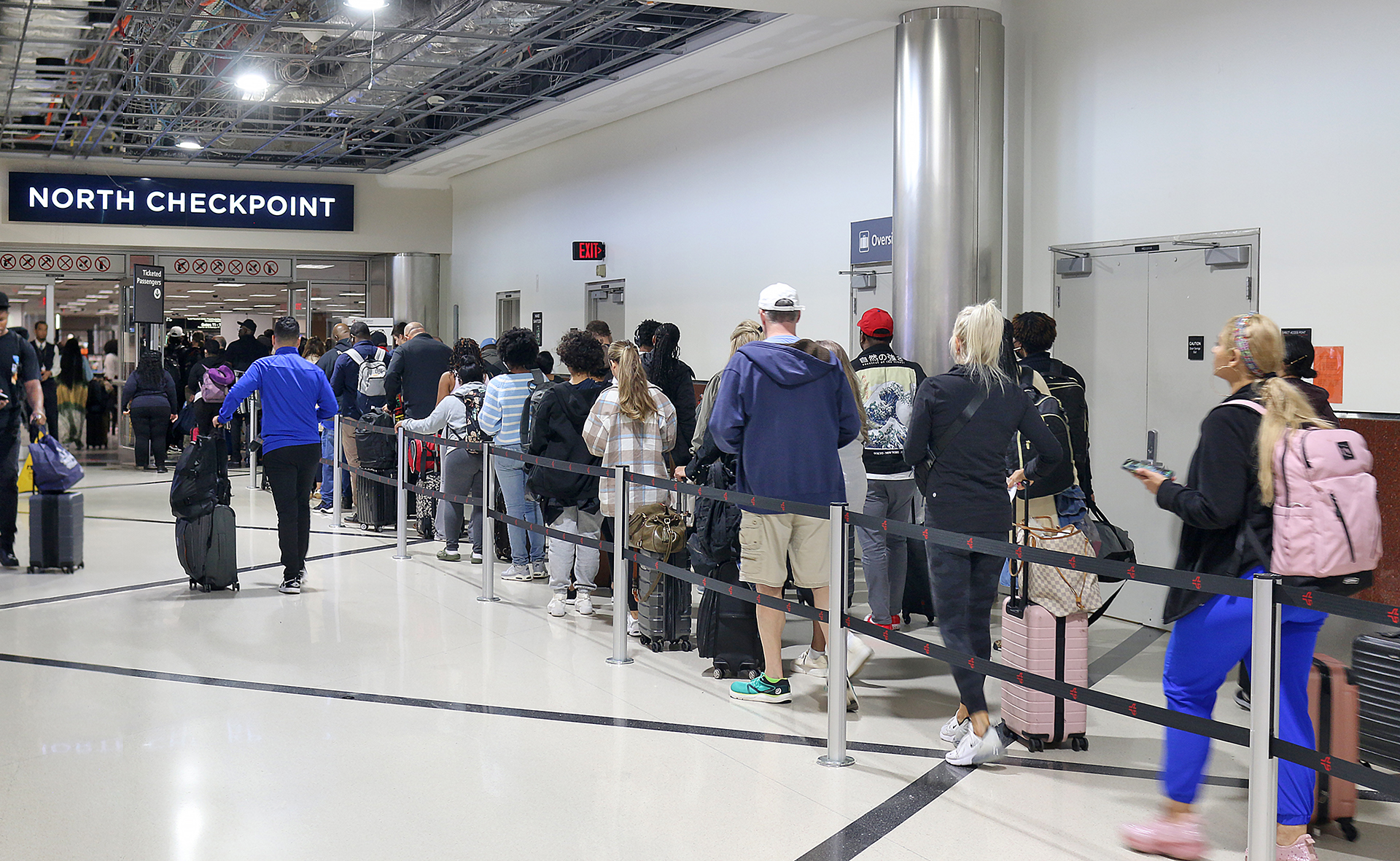
Long gone are the days when most passengers used to dress up for flights. Men wore suits and ties; while women wore dresses with high-heeled shoes and adorned themselves with jewelry. While one can still dress that way for a flight these days, dressing for comfort when traveling is far more important.
Consider wearing:
- Comfortable footwear so that you can:
- Rush through the airport, if necessary
- Wait in long lines if you encounter them
- Walk to and from your choice of transportation, which may be located far away
- Clothes in which you can comfortably move around and do no mind wearing all day
- Layers of clothing if you are traveling somewhere where the climate is typically cold climate, which will allow to strip layers when the temperature rises — and you can simultaneously pack fewer clothing items in your baggage
Avoid wearing:
- Jewelry, as it usually does not contribute to comfort — plus, you will increase your chances of losing jewelry
- Tee shirts and other clothing items that sport messages that could be perceived as offensive
- Clothing that is obviously dirty or soiled; or has a foul odor
- Salacious or revealing clothing — or lack thereof
16. Take Care of Your Body: Eat Well and Exercise.

Know yourself and your body.
Reducing stress is possible by the following ways to take care of yourself and your body:
- Eating a healthy meal before you arrive at the airport, as you will:
- Avoid buying expensive food:
- At the airport, where long queues are possible at the more popular places
- Aboard the airplane if meals are not included in the price of your ticket
- Not need to rely on a meal served during a flight — especially when their nutritional value and taste can be questionable
- Not be as concerned about the levels of sugar of your blood becoming imbalanced as you travel, as they can affect your overall mood
- Avoid buying expensive food:
- Get quality sleep on the night before your trip — note that quantity is not necessarily quality; so six hours of good solid sleep is usually preferable to ten hours of light interrupted restless sleep, as your body becomes fatigued when it does not get the rest it needs and becomes vulnerable to foreign germs and viruses
- Take vitamins if you take them on a regular basis
- If necessary, keep products that are designed to relieve stress on hand to decrease your chances of getting sick from the stress of travel and the germs in the re-circulated air in the airplane — but you are better off eating foods that naturally accomplish a similar result
You will need the proper nutrition to stay healthy and have the energy to do what you want to do during your trip.
17. Protect Your Photographs, Videos, and Notes.
In addition to souvenirs and memories, photographs, videos, and notes are the only items which remain after the trip has concluded. Unless you have a photographic memory, photographs, videos, and notes can be critical for reliving your memories from a trip.
What I do is copy my photographs, videos, and notes onto at least one external drive on a regular basis — especially prior to taking a trip. During a trip, I keep my digital files on Secure Digital cards and copy them to my laptop computer. You can duplicate your digital assets on other Secure Digital cards if you bring enough of them with you; but keep them stored separately from your camera.
You can also purchase storage on which you can keep your digital files via what is known as “the cloud”, which is really a device at a different location that is operated by a company. Items from “cloud” storage can be accessed from almost anywhere; and the companies that offer them usually guarantee safety and security for your digital files. Many companies and social media services offer a limited amount of “cloud” storage for free, which may be more than enough for your purposes.
The bottom line is that you can never duplicate your digital files enough to ensure that you have them whenever you want or need them.
18. Prevent Yourself From Getting Lost — Or What to Do If You Do Get Lost.

Some people actually enjoy just wandering off aimlessly into a location at which they have never been — which is great if they seek a rewardingly spontaneous and impromptu experience. Regardless of whether you are one of those people, you already have some type of Global Positioning System — or GPS — software on your portable electronic device to help you get around in many places around the world. They may not always be accurate — even if the maps are the latest versions — but they will help you get to where you want to go most of the time.
People who are either local or indigenous to a place will usually be more than happy to assist if they perceive for you to be lost — especially in countries and territories which thrive on the tourism industry. If you do seek assistance but do not speak the language, consider installing language translation software on your portable electronic device — or, at least, a translation disctionary — to help you communicate more efficiently. If that fails, find a hotel property or another place where English is likely to be spoken.
If you plan on using a taxi cab, ride sharing service, public transportation, or renting a vehicle, ensure that you conduct some research before your trip to obtain a rudimentary knowledge of the main roadways and routes around the city or area that you are visiting. Do not be afraid to tell the driver of the taxi cab that you want to take the quickest route — and beware of taxi cabs in which the driver claims that the meter is “broken”.
19. Keep Valuable Items and Medications With You at All Times.
If you cannot be without medication or items that are valuable to you, never store them in checked baggage or anywhere else where you may temporarily — or permanently — lose access to them. Your medication will become useless to you if you are seated aboard an airplane and need it but it is stored in a bag deep in the cargo hold, which cannot be accessed during a flight. Although the occurrence is somewhat rare, employees of the federal government, airlines, and airports have been known to steal valuable items from checked luggage.
Speaking of checked luggage, note that most airlines will not charge you to check your luggage at the gate if no more storage is available aboard the airplane. If that happens, be sure that your medication or items that are valuable to you are removed from the luggage before handing it over to the employees of the airline.
Also note that if the overhead storage compartments near the seat to which you are assigned are full, your bag may be placed in a different overhead storage compartment that may be a number of rows ahead or behind you. If you can place your bag in a space in an overhead storage compartment that is closer to the front of the airplane, you can simply grab it on your way out — but if it is closer to the rear of the airplane, you will likely need to wait until the passengers in the rows behind you leave first before you can retrieve it. Regardless, ensure that you have the items that are critical to you within your reach. You can ask for the assistance of a member of the flight crew; and he or she will usually help or impart useful advice on what to do.
20. Have Something to Look Forward To After the Conclusion of the Trip.
Travel can be stressful — but returning home from a big trip can evoke mixed emotions. Returning to your routine and adjusting to it may not be easy after months of anticipation, planning, and experiencing a major trip.
Consider at least one of the following ways to look forward once your trip has concluded and you have returned home:
- Meet with someone with whom you have not seen in a while
- Dine at a favorite restaurant
- Change something for the better in your home
- Book reservations for another trip — even if the trip is a small one — so that you can look forward to something new and exciting
Final Boarding Call
Although this list of 20 ways on how to reduce travel stress is not by any means an exhaustive one, at least some of the tips in this article should help you reduce stress while traveling — whether your trip is during the holiday season or at any other time throughout the year.
Please write and post any additional ways that you believe stress can be reduced pertaining to travel — as well as your experiences on how you reduce stress for yourself while traveling — in the Comments section below.
Thank you in advance.
Unless otherwise noted, all photographs ©2016, ©2017, ©2018, ©2019, ©2020, ©2021, and ©2023 by Brian Cohen.
